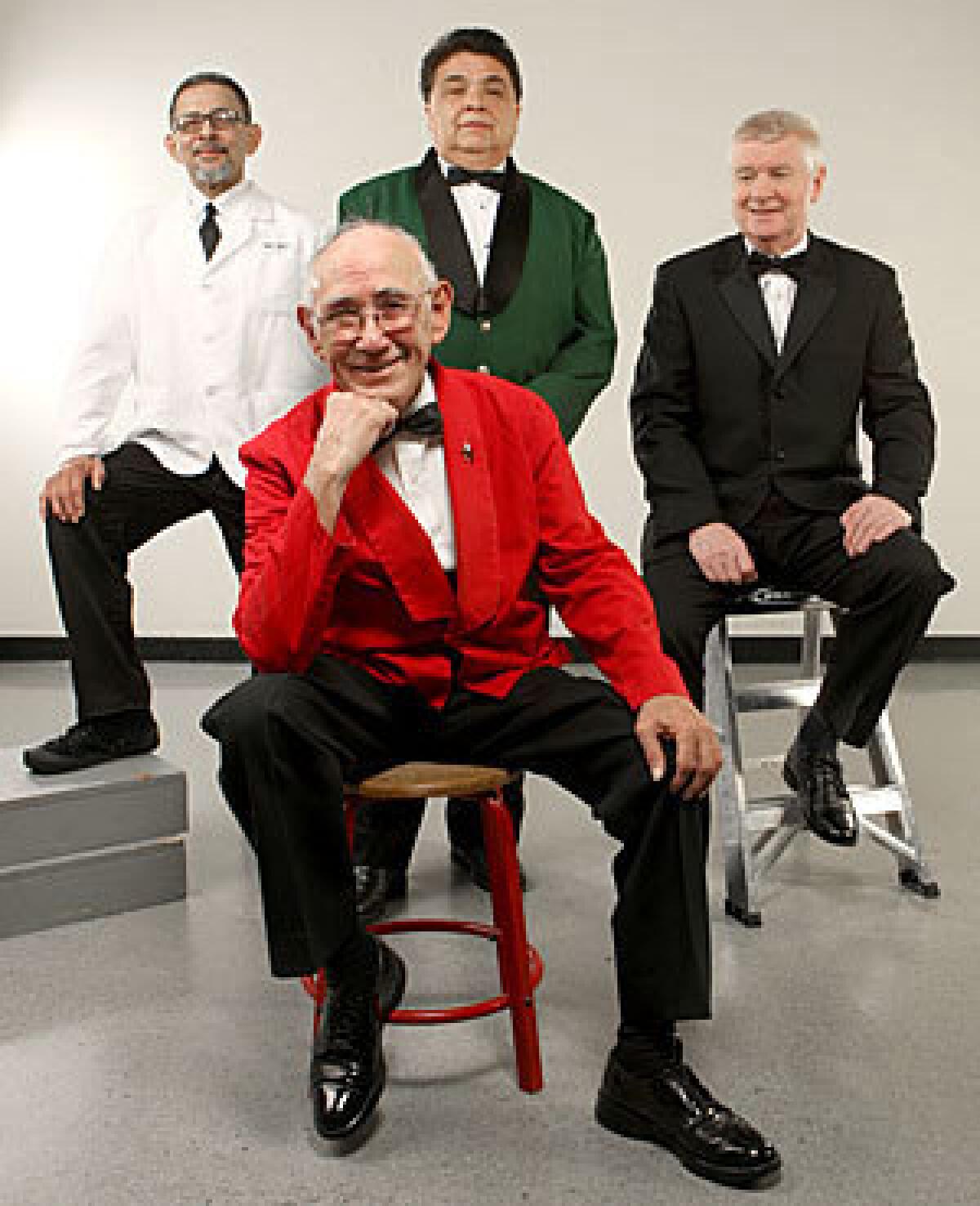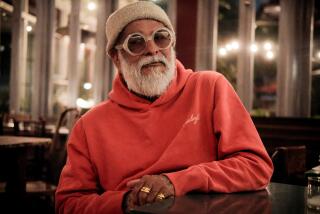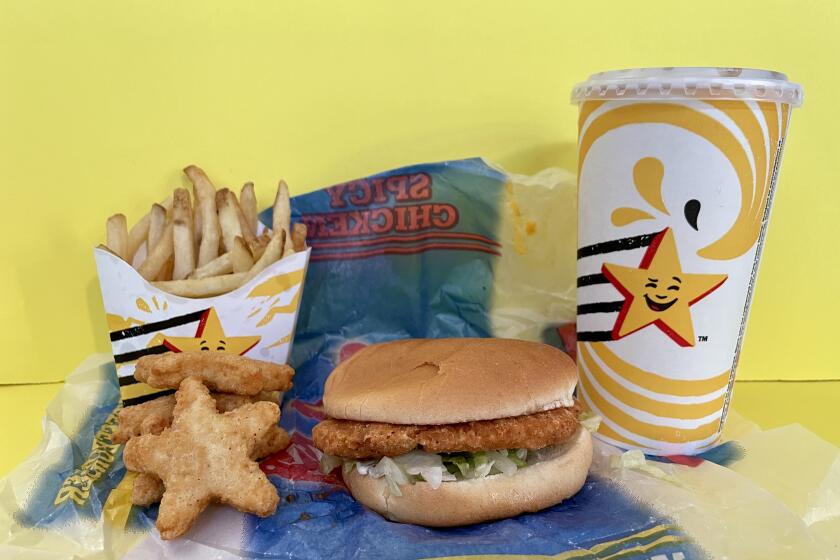Waiting tables is an art: 4 veteran L.A. servers who know

Good waiters -- no, they haven’t disappeared, no matter how it might seem to anyone who has felt like just another check average.
Meet old school: Vladimir Bezak, Manny Felix, Sergio Guerra and Pablo Zelaya. Among them, they have provided more than 100 years of service to countless diners across Los Angeles, their days measured in ice-cold dry martinis and perfectly cooked medium-rare steaks. Wars (including those against calories and carbohydrates) have been waged, presidents (and chefs) have come and gone, and meanwhile, they’ve looked after their customers down to the last detail, special requests indulged, cups of coffee refilled.
“Good service is a craft,” Guerra says. “This is my profession, it’s my living.”
They are, in Los Angeles, a rare breed -- career waiters, veteran career waiters. While at many restaurants it can be hard to get your server’s attention when you don’t have a spoon for your soup or you may have to suffer the yadda-yadda-yadda of introductions and upselling and instructions, these are consummate waiters who, always gracious, know exactly how to make you feel taken care of, without being oppressed. And though they all work at celebrity hangouts, if you’re expecting any juicy stories, forget it -- when pushed, they all fall back on the famous discretion of a great waiter.
The entertainer
Manny Felix has a smile as big as an iceberg wedge, wire-rim glasses and a Felix the Cat pin on his lapel. He has been working at Musso & Frank Grill for 37 years, 32 of them behind the counter. “They put me here as punishment . . . for drinking and womanizing,” he jokes.
There’s a party in the “new room” for a school board member, and on his way in, L.A. Councilman Tom LaBonge pauses at the counter, shakes Manny’s hand and announces, “This guy is one of the greatest in L.A.” Other men in suits accompanied by women in short dresses stop by to say hello. A cousin of a regular who’s visiting from Hawaii wants to take Felix’s picture, so he spreads his arms out wide, yells, “Ha-waii!” and grins.
Felix, 71, is inclined to sing Mexican love ballads or perform magic tricks -- the contents of a packet of sugar disappear in his hand, or he shows how money “grows” into a giant quarter.
“I started sitting at the counter almost every Thursday starting back in 1989 when I was a delivery boy at Paramount Studios,” says regular Jimmy “the Doc” Pappas. “I worked with a cantankerous old guy who took me there after work. He said, ‘Kid, if you’re gonna work in Hollywood, you need to go to the bar, knock two back, then sit at the counter with Manny and have him do some silly tricks for ya.’ ”
When asked what makes for good service, Felix says: “Let’s start with the origin of the word ‘tip.’ There was a box in the restaurant that said ‘TIPS,’ which stood for ‘to insure prompt service.’ I make sure you get your steak medium-rare or your broccoli with butter, and I get it to you right away. And it’s none of this phony-baloney, ‘Hi, my name is [mumbles] and I’ll be your server tonight.’
“And here’s a very big word -- respect. I respect the staff, the kitchen, that’s the secret of my relationship with the crew, and it’s how I get customers what they want. If you want something creative and I go to the pantry or sous chef or butcher, they’ll do it. It works very efficiently.”
Felix is behind the counter mixing anchovy dressing for two orders of “appetizer Frank” (tomatoes with chopped egg) -- a dressing he has made thousands of times. He whisks together coddled egg, dry mustard, garlic, minced anchovy, salt and pepper, a little vinegar and oil. And not “EVOO” (extra-virgin olive oil), but what he calls “EVOL.”
You’ve got to read it backward, he says.
Ever the pleaser
When Catherine Zeta-Jones comes in for lunch at the Grill on the Alley in Beverly Hills and tells Pablo Zelaya, “You know what I want? It’s a tuna sandwich,” that’s what she gets (even though it isn’t on the menu). Not because she’s a celebrity, Zelaya insists, but because “I don’t like to say no. It’s like they say: ‘The answer is yes. What is the question?’ ”
Zelaya landed a job at the Grill 25 years ago after working at the Chronicle in Santa Monica, when the alley was really just an alley (and not Fred Hayman Place) and the ceiling in the restaurant hadn’t even been installed yet.
“Time went so fast,” says Zelaya. “Once you come here, you stay. Everybody’s been here a very long time.”
Zelaya moved from El Salvador to Miami in 1968 and worked in New York, Washington, Chicago and San Francisco. “My idea was to travel, but I got to L.A. and fell for a girl. Now I’m a great-grandfather.”
Before he was a waiter, Zelaya, 65, was a bartender for 20 years, but “I had to break out to the tables,” he says.
He’s always a front waiter, the personality at the table who, with his slicked-back hair and stylish black glasses, comes across as debonair; he takes an order and slips it behind him, without even looking, to a back waiter who runs food between the kitchen and the table.
Zelaya still occasionally works lunches in “the maze” (some call it “the jungle”) -- the middle of the restaurant where tables are squeezed in tight to accommodate the midday crush. “The maze is tough, but you learn to move; it’s amazing we never bump into each other.”
When he is told that dance class is part of the training for the wait staff at Thomas Keller’s Per Se in New York, his eyes light up. “That’s a good idea,” he says.
So much of the work is about timing and pacing, he says. For waiters, everything moves fast, but for a diner waiting for something, “Five minutes can be an eternity.”
The most important thing, he says, is to return to the table within two to three minutes after the food has been served. That few minutes is a window of opportunity to correct diner displeasure -- when a missing fork or a wrong order can leave a customer groping for help.
New servers can get overwhelmed when it’s busy and forget to check on a table, he says. Or they neglect the small things, “removing empty sugar packets from the table, making sure the bread isn’t cut too early [so that it won’t get dry], maybe putting fresh ice in a half-filled glass of Coke. It’s constant.”
Understated pro
Sergio Guerra has been working at the Pacific Dining Car long enough to earn weekends off -- it only took 19 years. All told, he has been at the 88-year-old landmark near downtown for 25 years, long enough to put his five children through college.
He starts each day by eating breakfast with his wife of 41 years, goes to the gym and leaves his house in Fullerton by 3:15 p.m. “I like to get to work about 30 minutes early,” he says. By 5 p.m., when his shift officially starts, he has donned his black bow tie and his green jacket with the black lapels and gold buttons.
Each server works his own station with the help of one busboy -- there’s no back waiter or runner -- so the waiter is responsible both for taking orders and getting food to the table (whereas at Dan Tana’s or the Grill on the Alley, for example, it’s a three-person job -- captain/front waiter, kitchen waiter/back waiter, busser).
“It used to be very strict,” says Guerra, 60, who started working for the family of Pacific Dining Car founder Fred Cook at the erstwhile Cook’s Steak House downtown in 1977 but then moved to the Dining Car when Cook’s lost its 50-year lease in 1983. “You didn’t say anything to the tables. You’d just pass by” so that your presence was known. “Since the ‘90s, it’s more liberal.”
It’s hard to tell. Despite his baronial presence and baritone voice, Guerra is discreet. “My job is to take care of customers, to be polite, attentive and be seen at the table without making a lot of it,” he says.
It’s a matter of pausing for a brief second to give the diner a chance to catch your attention if necessary, says general manager Nick Lerner, who calls the menu an “open optional menu” (meaning you can get a T-bone and ask for a fried egg on top and hash browns instead of a baked potato, maybe some avocado on the side, and for dessert, a waffle). Or stopping at the table to remove something that shouldn’t be there, adjust something, lift the napkin on the bread basket to check if there’s enough bread. “Most people are adult enough to know what they don’t have and want,” he says. “All you need to be is be available to do it.”
“Sergio and Rodney Lennon [a Dining Car veteran of 21 years] are my best waiters,” says Lerner, who worked as a server for 25 years. “Very tidy, very particular, very spit-’n’-polish.”
Old-world charmer
On a recent Thursday evening at West Hollywood Italian restaurant Dan Tana’s, it is -- as it is most nights -- packed to the gills. They’re three deep at the bar, the din of conversation is bouncing off the walls and rafters, the maitre d’ is being plied, unsuccessfully, with the offer of a shot of tequila in exchange for a table, and Vladimir Bezak is one of two captains on the floor. He’s easy to spot: His close-cropped hair is pure white, and he’s wearing a black tuxedo.
At a restaurant packed this tightly, just getting the food to the tables is an art.
“It’s always been this way -- it’s the same crazy place,” says Bezak, who started at Dan Tana’s in 1980, when he also was working the lunch shift at the Bistro Garden, where Spago is now. Maybe not exactly this way. Until several years ago, the waiters navigated the dining room with large trays from which to serve chicken cacciatore, lamb chops and several kinds of veal scaloppine. Now plates are carried directly to the tables. “It’s easier,” Bezak says, and safer, recalling the time that a small dish of oil and garlic slipped from one of the trays directly into the pocket of a customer’s black leather jacket (the jacket was replaced).
Bezak squeezes through a narrow pathway between tables. Three designer-suited, bright-tied lawyers are cutting into their New York strip steaks (the only kind served here and named after regular Dabney Coleman). One of them reaches around the back of the booth, grabs Bezak by the waist and shouts, “I love you!” Bezak flashes a big smile and is already at the next task at hand, asking a woman at Table 9 whether she’d like Parmesan cheese on her spaghetti.
Bezak, 61, grew up in Bratislava, in what was then Communist-ruled Czechoslovakia and is now Slovakia, wanting to see the world. “It was all fences and wires. I could see Austria across the Danube, but I couldn’t go there.”
At Dan Tana’s, the world (the cast of regulars includes George Clooney, Sumner Redstone, Jay Leno) comes to him. Often all at once. “Sometimes three parties will be seated in two minutes or I’ll work six or seven tables alone,” Bezak says. “That’s when you know you are good or no good.”
There’s always an emergency, says maitre d’ Craig Susser, who has worked with Bezak for 18 years and describes him as having “old-world charm, always cordial but not obtrusive.”
“Four tables will want something at once, checks have to be priced out, someone didn’t get their mustard, forks and knives need to go on a table, and then something else comes up. You have to have your head in it. Vladimir anticipates everything.”
It gets to be second nature, Bezak says. “It’s like getting up in the morning and combing your hair.”
More to Read
Eat your way across L.A.
Get our weekly Tasting Notes newsletter for reviews, news and more.
You may occasionally receive promotional content from the Los Angeles Times.











